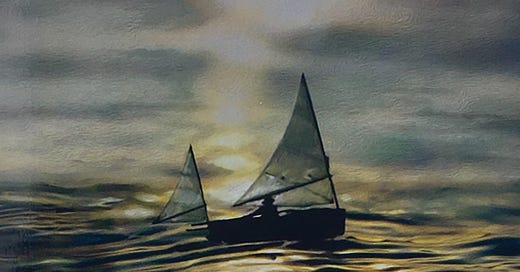My foreword from the second edition of Stephen Ladd’s Three Years in a 12-Foot Boat
“You won’t find reasonable men on the tops of tall mountains.” Hunter S. Thompson
"The dangers of life are infinite, and among them is safety." – Goethe
It’s usually about the third or fourth night of a small-boat cruise when I start wishing I were home. Don’t get me wrong, I love sailing and cruising little boats—I’ve made my living writing about the subject for almost 20 years—but after three or four days aboard a little boat the comforts of home begin to look really, really good.
I once spent five days and nights in an eight-foot plywood boat sailing down the hot and windy South Texas coast, spending as long as 13 hours at the helm one day. Within a few days I couldn’t feel my backside—except for the nascent crop of sores—and my hands had swelled inexplicably. My boat was quite literally starting to come apart, and most of my “non-perishable” provisions were rapidly perishing in the sweltering heat. My nerves were seriously frayed. If I’d been anywhere near civilization on that third night I would have happily thrown in the towel.
Even short outings on a small boat inevitably involve bumped and bruised shins, cuts and scrapes, chafed hands, and assorted aches and pains. It’s not unusual to wake-up after a night on a camp-pad or thin foam cushion, stuffed into a small-boat berth, and feel as if you’ve been involved in a minor car crash.
What little movement is possible isn’t accomplished by standing and walking as on terra-firma, instead the sailor must slide, crawl or shuffle awkwardly—often while compensating for the boat’s heeling and bucking and trying to keep one hand always holding on. Frequently circumstances—shipping traffic, high winds, or weathering a point—require the sailor to sit, fixed in one strained position for most of a day. Alternatively, in a dead calm he might be forced to row until hands blister.
If the little boat has a cabin, standing below is out of the question, and even sitting headroom might be a coveted luxury. So the sailor sits hunched over or cross-legged trying not to bang his head on the nuts and bolts coming down through the deck, some of which already have strands of his hair hanging from them. Just slipping-on his boots can require the contortions of a yogi.
Cooking aboard a little boat underway is a perilous adventure of its own, with open flames and boiling liquids, and even at anchor the smallest boats require cooking take place out in the cockpit, regardless of weather. And let’s not bother to discuss considerations related to hygiene, buckets, and a little boat’s lack of facilities.
I mention all of this only to help put Steve Ladd’s remarkable voyage in perspective. While spending the better part of three years aboard a 12-foot boat will surely sound extraordinary, even to a non-sailor, I’m guessing most will still fail to comprehend the sheer audacity and severity of it all. Consider that it’s common knowledge among cruising sailors that the smallest boat one should take to sea is something on the order of 34 feet and 10,000 pounds. Ladd’s 12-foot Squeak weighed 250-pounds—which is, coincidentally, the approximate weight of a standard adult casket.
Of course if like most of us, Ladd had limited his voyaging to the familiar waters of his home country—where the routes are well-worn and help never more than a VHF or cell phone call away—it would have been a less interesting tale. Instead, after sailing and rowing down the Mississippi River, Ladd and Squeak transited the Panama Canal and set sail south along the tangled, desolate, pirate-infested waters of Central and South America. What follows is an epic adventure—a dramatic voyage full of both predictable and unpredictable obstacles, and plenty of self-discovery
When I first read it I couldn’t help but imagine trying to be my best and most capable self—whether facing-off criminals or negotiating with crooked government officials, or landing my little boat in high surf—while I’ve been living day after day in a space smaller than most closets.
Like his writing, Ladd’s voyage was honest and austere. He ventured totally exposed and vulnerable under an equatorial sun with swirling, turbulent foreign waters never more than few inches beneath him. Few people have the disposition for this kind of adventuring without a safety net. Fortunately for the rest of us, sometimes they make it home and write a book.—Josh Colvin •SCA•




I met Stephen Ladd at one of the Port Townsend Wooden Boat Festivals a few years ago, had a good look at "Squeak". Very interesting, SCAMP was at that time a few years off in the future, and while I would not credit Stephens boat with inspiring my own design, it did provide me with something to think about in the way of use of space.
Wow - are you going to publish it here, chapter by chapter, I hope? Pleeeze?
You had me guffawing with remembering - "...the nuts and bolts coming down through the deck, some of which already have strands of ... hair hanging from them...." oh yes. I know that one!